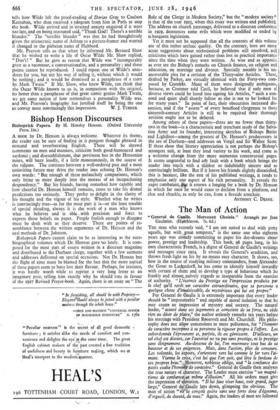Bishop Henson Discourses A Bow( by Dr. Henson is always
welcome. Whatever its theme, the reader can be sure of finding in it pungent thought phrased in orotund and reverberating English. There will be shrewd comments on men and manners, criticism both good-humoured and sardonic ; and disestablishment, that persistent bee in the Hensonian mitre, will buzz loudly, if a little monotonously, in the course of the vollime. The contrasts between a well-ordered past and a most uninviting future may drive the reader into echoing Dr. Henson's own words: " But enough of these melancholy comparisons, which only bring us more deeply into the morass of an incapacitating despondency." But his friends, having remarked how capable and how cheerful Dr. Henson himself remains, cease to take his dismal predictions too seriously. They prefer- to delight in the clarity of his thought and the vigour of his style. Whether what he writes is convincingly true—as for the most part it is—or the least tenable of special pleading, always it is the work of a man who knows what he believes and is able—with precision and force to express those beliefs on paper. People foolish enough to disagree must be dealt with as they deserve. There are points• of re- semblance between the written arguments of Dr. Henson and the oral methods of Dr. Johnson.
Bishoprick Papers cannot claim to be as interesting as the auto- biographical volumes which Dr. Henson gave 'us lately. It is com- posed for the most part of essays written in a diocesan' magazine and distributed to the Durham clergy, together with a few sermons and addresses delivered on special occasions. Not Dr. Henson but the flight of time must be blamed for the fact that the more topical of these papers seem to have lost their flavour. Perhaps, for instance, it was hardly worth while to reprint a very long letter to an imaginary peer, telling him exactly why he should vote in favour of the 1927 Revised Prayer-book. Again, there is an essay on " The Role of the Clergy in Modern Society," but the " modern society ?' is that of the year 1925, when this essay was written and published. The address on church patronage, delivered to a diocesan conference in 1929, denounces some evils which were modified or ended by subsequent legislation.
Yet it must not be supposed that all the contents of this volume are of this rather archaic quality. On the contrary, here are many acute suggestions about ecclesiastical problems still unsolved, .and criticisms which have gained rather than lost in practical importance since the time when they were written. As wise and as apposite as ever are the Bishop's remarks on Church finance, on religion and education, on marriage and divorce. Specially notable is his un- answerable plea for a revision of the Thirty-nine Articles. These, drafted by Parker, are virtually identical with the Forty-two, com- posed by Crani4r. Many of them were designedly ambiguous, because, as Cranmer told Cecil, he believed that if only men of
diverse views could be lured into signing his Articles, " such a con- cord and quiet, shall shortly follow as else is not to be-looked for
for many years." In point of fact, their obscurities increased dis- sension, and if the " assent " of every beneficed clergyman to these sixteenth-century Articles is still to be required their thorough revision ought not to be delayed.
Among others of these papers—there are no fewer than thirty- two in the book—is a characteristic and trenchant study of the Salva- tion Army and its founder, interesting sketches of Bishops Butler and Lightfoot—among the greatest of Dr. Henson's predecessors in the see of Durham—and addresses on Vergil and Sir Walter Scott.
If these show that' literary appreciation is not perhaps the Bishop's strongest, suit, at least they lend variety to his work, and come as a welcome cbangb from the more numerous controversial pages.
It seems ungrateful to find arty fault with a book which brings the reader into touch with a thinker so indubitably sincere and so convincingly brilliant. But if it leaves his friends slightly dissatisfied, this is because, like the rest of his published writings, it tends to emphasise only one aspect of his rich personality. It reveals the eager combatant, ret it renews a longing for a book by Dr. Henson in which for once'-fie would cease to declaim from a platform, and chat and chuckle, as only he can, from a fireside armchair.
• ANTHONY C. DEANE.






























 Previous page
Previous page